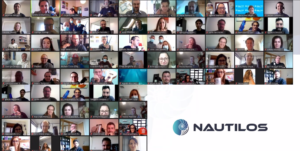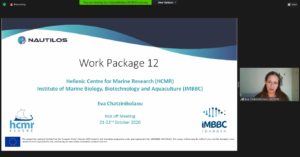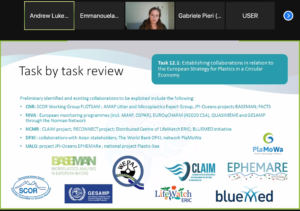
The Kick-off meeting of the newly launched H2020 project NAUTILOS (New Approach to Underwater Technologies for Innovative, Low-cost Ocean obServation) took place during the 21-22 of October 2020. NAUTILOS brings together a large consortium of 21 partners from 11 European countries and is highly interdisciplinary combining oceanography, engineering, physics, chemistry, biology, data modelling and social sciences. The project is funded by H2020 (call H2020-BG-2020-1) with a total budget of about 9,050,000 € and will run for 4 years, until September 2024. The project coordinator is Dr Gabriele Pieri and the coordinating institute is the National Research Council of Italy (CNR).

HCMR scientists from both the Institute of Marine Biology, Biotechnology and Aquaculture (IMBBC) and the Institute of Oceanography (IO) participate in the implementation of the project. Dr Eva Chatzinikolaou from IMBBC is the Principal Investigator of the project for HCMR and she is also leading WP12 “Synergies with European Strategy for Plastics in a Circular Economy (ESPCE)”, while Mr Manolis Ntoumas from IO is leading WP7 “Demonstrations of NAUTILOS-developed sensors and samplers”.

NAUTILOS will fill in existing marine observation and modelling gaps through the development of a new generation of cost-effective sensors and samplers for physical (salinity, temperature), chemical (inorganic carbon, nutrients, oxygen), and biological (phytoplankton, zooplankton, marine mammals) essential ocean variables, in addition to micro-/nano-plastics, to improve our understanding of environmental change and anthropogenic impacts related to aquaculture, fisheries and marine litter. Newly developed marine technologies will be integrated with different observing platforms and deployed through the use of novel approaches in a broad range of key environmental settings (e.g. from shore to deep-sea) and EU policy-relevant applications (e.g. ESPCE). The fundamental aim of the project is to complement and expand current European observation tools and services, to obtain a collection of data at a much higher spatial and temporal resolution than currently available at the European scale, and to further enable and democratise the monitoring of the marine environment to both traditional and non-traditional data users. Extensive citizen science initiatives are organised in order to facilitate public awareness and engagement.
For more information please visit the project’s website: www.nautilos-h2020.eu





